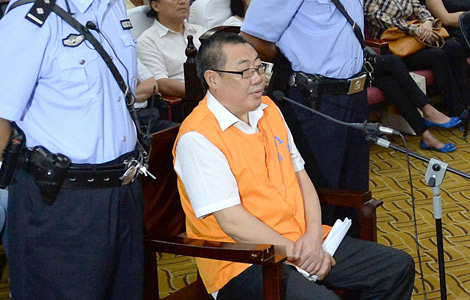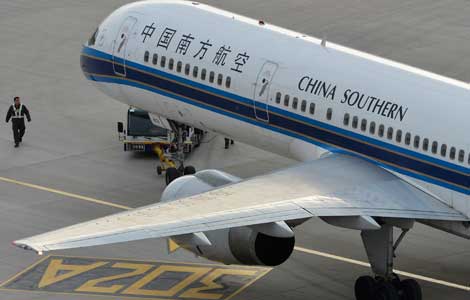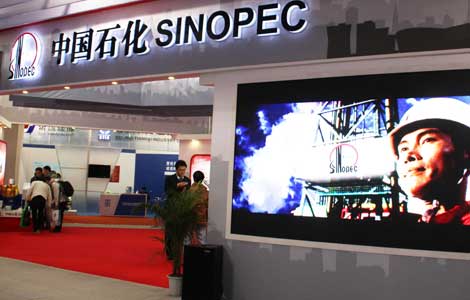Error costs Everbright millions
Updated: 2013-08-31 02:53
By Chen Jia (China Daily)
|
||||||||
4 executives banned from industry after computerized trading mistake
It took only three minutes. The operational error made by Everbright Securities two weeks ago has earned it a 523 million yuan ($85 million) fine from the nation's top securities regulator, for insider trading, release of misleading information, and muffed risk control.
That is the largest fine the regulator has ever given a securities brokerage in the history of the country's stock market.
China Securities Regulatory Commission announced the punitive measures on Friday after a two-week investigation of Everbright Securities' near hysterical trading behavior that shocked the domestic A-share market on Aug 16.
The brokerage will be fined five times its insider-trading-related gains, the CSRC spokesman said.
In addition, Everbright Securities' former president Xu Haoming, assistant executive Yang Chizhong, general manager of the accounting department Shen Shiguang and general manager of the strategic investment department Yang Jianbo were each fined 600,000 yuan. And they were all banned from the securities industry for life.
Xu resigned after the firm caused the biggest swing in the benchmark stock index since 2009.
Mei Jian, secretary of the board of directors of Everbright Securities, was fined 200,000 yuan for giving the media erroneous information on how the abnormal market fluctuation occurred, an error that influenced investors' decisions that day.
The CSRC also banned the securities company from proprietary trading for three months and suspended approval for new Everbright services.
The penalties may hurt the company's business and its brand reputation, possibly causing its shares to drop sharply next week, analysts said.
However, online chat rooms were abuzz with people saying the penalties were too lenient.
As of 9 pm on Friday, a survey on ifeng.com, a popular news portal, showed that more than 80 percent of 30,000 respondents thought that Everbright had manipulated the stock market and should be fined more.
Everbright's proprietary business mistakenly sent buy orders worth 23.4 billion yuan on Aug 16 to the Shanghai Stock Exchange, and finally completed transactions of 7.27 billion yuan, which lifted the Shanghai Composite Index by 5.96 percent in three minutes.
The company's four chief decision-makers decided to short-sell the stock index futures in order to hedge risks, before disclosing the information to the public market.
According to the leader of the investigative department of the CSRC, the trading system, described as an innovative "high-frequency" trading program, one that makes a large number of trades in a very short time, had been used for fewer than 15 trading days. The brokerage only began designing it in June.
Everbright's strategic investment department had never been included in the company's internal risk control system. The flaws in the technology were not discovered because of insufficient testing, the CSRC said.
Huang Wei, the CSRC legal department's director-general and chief counsel, said on Friday that this is an "extreme"case scenario that had never before occurred in China's equity market, and it alerted the watchdog to the need for better laws and regulations.
"This year, one of our key tasks is to research and modify the Securities Law and prepare to create a Futures Law," Huang said.
To date, there has been no law or regulation specifically dealing with high-frequency trading.
Huang explained that Everbright was not found to have manipulated the market because there was no evidence that employees had acted with the intention of making a huge gain through the buy orders.
Song Yixin, a lawyer from Shanghai Xinwang Wenda Law Firm, suggested building a mechanism in stock exchanges that can immediately stop trading when abnormal signals come out.
He also called on Everbright to set up a special fund that can be used to compensate investors.
As earlier reported in the media, every shareholder who owns Everbright's stock could have lost 4,160 yuan on average on the first day of trading after the incident.
According to the CSRC, investors who suffered losses from the incident can sue for compensation.
"It's good news for the stock market, because the CSRC's quick action showed its determination to keep a tight lid on on illegal trading, which can better protect investors' interests," said Gui Haoming, chief analyst of the Shenyin Wanguo Securities Co.
Everbright Securities, a unit of State-owned China Everbright Group and the seventh-largest brokerage by assets, had net income of 810 million yuan in the first half, a 2.2 percent decrease from the same period of last year.
-
 5.9-magnitude quake jolts SW China
5.9-magnitude quake jolts SW China 
 Li revenges on Robson to reach last 16
Li revenges on Robson to reach last 16
 Xi urges military to expand training
Xi urges military to expand training
 'Brother Watch' pleads guilty to corruption
'Brother Watch' pleads guilty to corruption
 Flight team performs first show abroad
Flight team performs first show abroad
 Theater to be built at Terracotta Warriors site
Theater to be built at Terracotta Warriors site
 Economic slowdown, railways hold back airlines
Economic slowdown, railways hold back airlines
 Sinopec takes stake in Egyptian oil
Sinopec takes stake in Egyptian oil
Most Viewed
Editor's Picks

|

|

|

|

|

|
Today's Top News
Liquid ammonia leak kills 15 in Shanghai
5.9-magnitude quake jolts SW China
UK asked NY Times to destroy Snowden material
US boosts troops in Philippines amid tension
Xi urges military to expand training
US: 1,429 killed in chemical attack
IMF warns on capital account
Trending news across China
US Weekly

|

|







